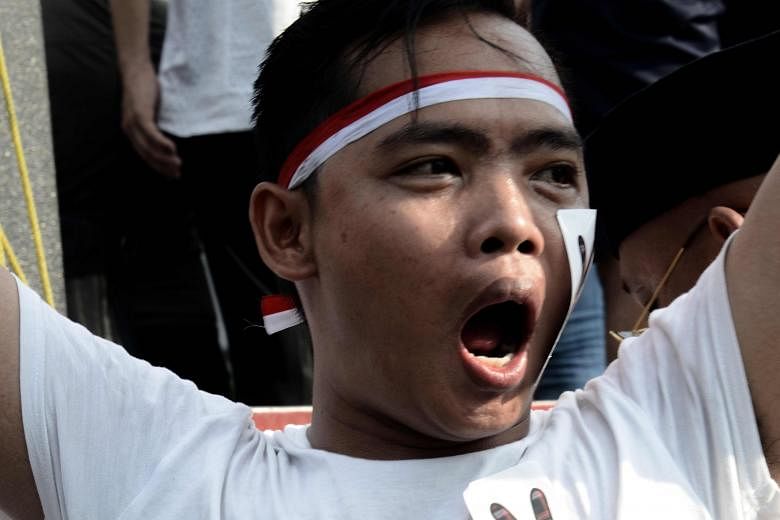Indonesia will review its anti-blasphemy laws following last week's recommendation by the United Nations Human Rights Council, said Law and Human Rights Minister Yasonna Laoly.
The move comes amid calls against the controversial imprisonment last Tuesday of outgoing Jakarta governor Basuki Tjahaja Purnama for insulting Islam.
The European Union, Asean Parliamentarians for Human Rights and Amnesty International, among others, have also expressed concerns over the guilty verdict.
Mr Yasonna was speaking to reporters after returning from Geneva, where he attended the UN-sponsored Universal Periodic Review, or UPR.
Representatives from Indonesia and 13 other UN member states were in Switzerland for a periodic review of its human rights records.
-
Prosecution appeals against sentence
State prosecutors have made the rare move of filing an appeal against a court decision to sentence outgoing Jakarta governor Basuki Tjahaja Purnama to jail for blasphemy.
One of Basuki's lawyers confirmed that the High Court has received the prosecution's appeal. "They appealed on Monday and we, the lawyers (of Basuki), received information about it today," said Ms Josefina Syukur[/TUESDAY], The Jakarta Post reported yesterday.
The news followed a hint last week by Attorney-General H. M. Prasetyo that the state may appeal.
Basuki, also known as Ahok, was sent to jail on May 9 after the North Jakarta District Court found him guilty of blasphemy. The unexpectedly harsh two-year jail sentence was against the prosecution's recommendation of two years' probation on a lesser charge of insulting Muslims.
Basuki has also indicated that he will be appealing the verdict. Yesterday, his lawyers handed over a draft of his appeal to him at a police detention centre in Depok, where he is being held.
The ethnic-Chinese Christian politician was first sent to Cipinang prison in East Jakarta, but was later transferred to Depok.
Law and Human Rights Minister Yasonna Laoly had said the transfer was because Basuki had received death threats, but he later clarified that the information came before Basuki was sent to jail on May 9.
Mr Rolas Sitinjak, another of Basuki's defence lawyers, has also dismissed the rumours.
Francis Chan
"When I was in Geneva attending the UPR, there were demands and recommendations in regard to (Indonesia's laws on) religious minorities, freedom of expression, religious freedom, blasphemy and others," said Mr Yasonna.
"We will discuss it progressively, and a thorough review is also needed, but there are already decisions relating to that matter."
The minister was referring to Article 156(a), which criminalises anyone who deliberately, and publicly expresses feelings of hostility, hatred or contempt against religions with the purpose of preventing others from adhering to any religion.
Mr Yasonna did not provide a timeline or details of the review of 156(a) and his ministry also did not reply to queries from The Straits Times on Monday about the move.
His announcement of the review came a day after a district court sentenced Basuki, a Christian minority politician, to two years in jail for blasphemy against Islam.
It was the second major setback for the popular politician, better known by his Chinese nickname Ahok, in as many months. Basuki had lost to former culture and education minister Anies Baswedan at the gubernatorial election last month.
The decision to hand Basuki a heavier sentence - after the prosecution had recommended probation - was panned by critics, who said the judges had bowed to public pressure by hardline Muslims.
"We are concerned by (the) jail sentence for (the) Jakarta governor for alleged blasphemy against Islam," said UN Human Rights Asia in a tweet last Tuesday shortly after the hearing. "We call on Indonesia to review (its) blasphemy law."
The law was first enacted by founding president Sukarno and later implemented by his successor, Suharto, in 1965.
Human rights group Setara Institute said that of 97 cases brought to court since then, 89 were filed after the fall of Suharto in 1998.
Amnesty International, however, said it recorded 106 convictions for blasphemy cases, including some that received prison sentences of up to five years, when Dr Susilo Bambang Yudhoyono was president from 2004 to 2014.
While lawyers and human rights activists The Straits Times spoke to yesterday welcomed the move to review what they say is an archaic law, most remain sceptical about any near-term change.
Indonesian legislative expert Amir Karyatin said such reviews typically go through a long and onerous process, and he expects resistance from conservative groups.
"The government would first have to propose any changes to Parliament and all relevant parties - including religious leaders, legal experts - must be invited and be heard on their views,"he said. "If they see more negatives than positives in doing so, they would not go ahead."
Lawmaker Asrul Sani from the United Development Party said the law is still needed "to avoid social conflict".
"I don't agree with scrapping it," he told The Jakarta Post yesterday. "Can you imagine what would happen if there was no regulation and then someone insulted a religion? People would use their own 'legal system'."

